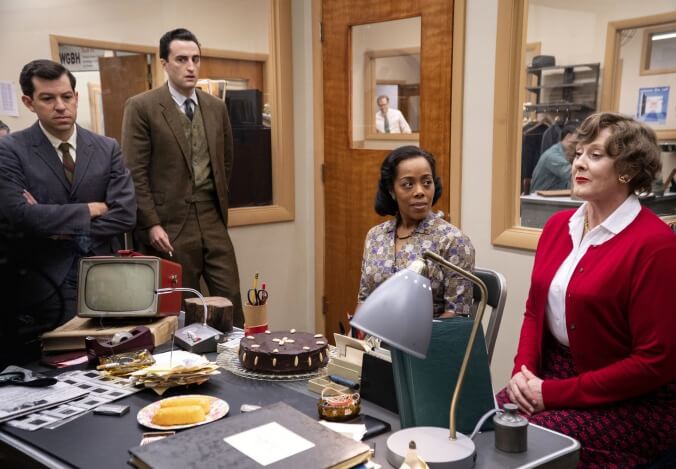HBO Max’s Julia is tasty TV comfort food
Sarah Lancashire carries this attractively plated comedy about the game-changing cooking teacher

Ever since a plump Fuji made Adam drool, humans have been wired for food porn. If not, we wouldn’t Instagram brunch, the Food Network would’ve flopped in 1993, and we’d draw a blank at the name Julia Child, mother of all TV cooking shows. Almost sixty years ago, the lanky, bassoon-voiced cook debuted The French Chef on Boston public television, and the making and broadcasting of vittles has never been the same. Now HBO Max’s earnest and elegant eight-part Julia traces its culinary hero’s arc from eccentric housewife to national nourisher.
Set mostly in Boston in the early ’60s, with occasional excursions to San Francisco and New York, each episode is marked by gentle flavors and delicate textures. It avoids anything too close to the period series it evokes—Mad Men and The Marvelous Mrs. Maisel—with none of the toxic sexuality and deceit of the former and far less screwball whimsy of the latter.
Created by Daniel Goldfarb (who wrote for Maisel), Julia lovingly crafts a portrait of a happy marriage—that of Julia and Paul Child (Sarah Lancashire and David Hyde Pierce), plucky, older aesthetes with a passion for the senses. As it progresses, Julia widens its scope to embrace workplace politics, early feminism, and the downside of celebrity, all side dishes that bake more gradually.
The series opens with Julia in Norway with Paul (who’s stationed there for the U.S. Foreign Service), on the eve of the publications of her first book, Mastering The Art Of French Cooking. Then the pair relocates stateside, to Cambridge, Massachusetts, as Mastering is doing brisk sales, and she’s become a local celebrity. Subsequently guesting on a book-chat show on public television station WGBH, Julia charms the condescending host (Jefferson Mays) by whipping up an impromptu omelet on set. The station receives 27 fan letters, and our protagonist has her lightbulb moment: a weekly cooking program of French dishes.
Since history tells us things will turn out just fine, Goldfarb and his writers find plausible ways to inject precarity into the journey. The office culture at WGBH, which one might expect to be liberal in 1963, is depicted as white, male, and smug. Kindly but pretentious producer Russ Morash (Fran Kranz) thinks the station should air documentaries and political roundtables, not strange women quartering chicken on camera. The snobbery goes both ways: Paul also initially rejects Julia’s idea, regarding television as a vulgar, passing phase.
Still, Julia’s burbling optimism enchants Alice (Brittany Bradford), a young Black producer navigating sexism and microaggressions on her own. In its unshowy way, Julia is as much a feminist fellowship tale as a backstage chronicle. The future star surrounds herself with staunch women who laugh, quaff afternoon cocktails, and commiserate about male egos. “I imagine a confederacy of women, an estrogen safety net,” Julia tells her editor and friend, Avis DeVoto (Bebe Neuwirth, all silk and salt), inviting her to join the French Chef squad.
Each 45-ish-minute episode walks a line between sentimental period drama and high-toned sitcom. Culture vultures will appreciate cameos from John Updike and James Beard, as well as the literate banter (surely, it’s no coincidence that the ensemble includes Frasier veterans). And if the banter starts to wilt, the Julia’s delectable meals never do: lemon-drenched oysters, juicy steak frites, buttery lobster, and gallons of wine and martinis.
The season arc is fairly standard: obscure genius fights for recognition, encounters resistance, and defeats it to become a success—at which time ambivalence enters the picture. The nearest Julia has to a villain is Feminine Mystique author Betty Freidan (Tracee Chimo), who chides Child at a public television gala for setting back the cause. It’s a powerful moment that shakes Julia and complicates her status as female liberator.
And it raises a legitimate question: Is Julia Child truly a cultural hero? Or was she (like Don Draper, come to think of it) a gifted salesperson who reinvented herself in the addictive pursuit of the American Dream? Perhaps both. We never doubt for a second her love of cuisine, of Paul, and her unfailingly democratic acceptance of others. But it will be interesting to see if Julia follows the path of The Crown, jumping decades into the future to see how time and fame take their toll. (Her strained relationship to the LGBTQ+ community is hinted at in a college-reunion trip to Smith.)
Other shadows that fall across Julia’s sunny path include the erosion of privacy and finding herself the inspiration for an impersonator on a publicity trip to San Francisco. For a woman who subverts gender expectations without trying, seeing a man playing her is both flattering and humiliating. “One of the advantages of looking like me is that I learned at a young age how not to take no for an answer,” Julia tells Alice. When the world cries, “Yes!”, she finds that brings a different set of problems.
Hero or cultural fluke, Julia was a unique individual turned icon who inspired devotion. Lancashire carries the season on sturdy shoulders, finding endless variations on her character’s repertoire of vocal and physical tics: the clucking and cooing, lurching movement, sudden gales of laughter. Like her subject, she’s fascinating and adorable. As Paul praises his wife: “You’re teaching Americans how to taste life, and they’re listening; that’s goddamn huge.”
Dignified, talented people being kind to one another as they savor existence to the last bite. Does that whet your appetite? We’d ask for seconds.